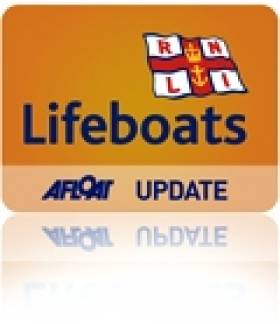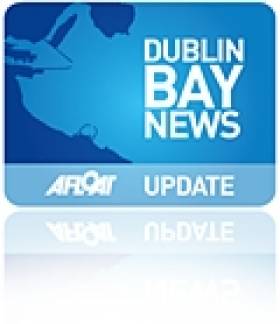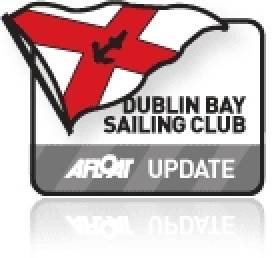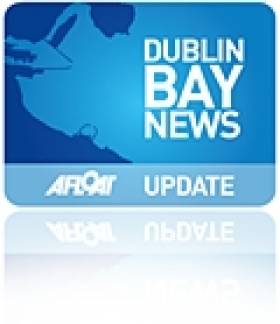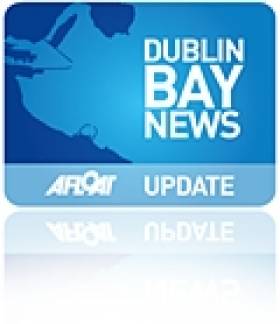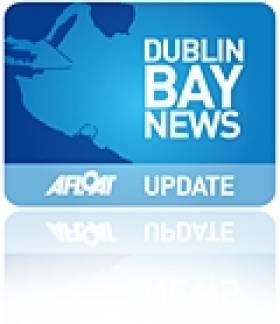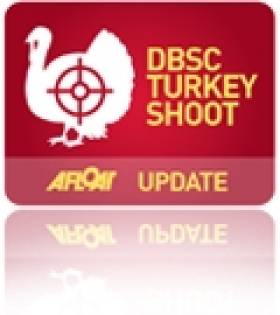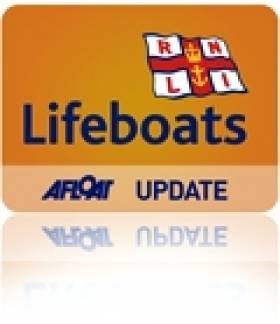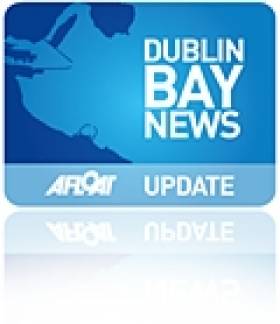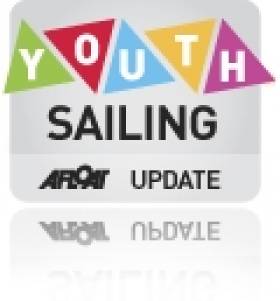Displaying items by tag: INSS
#rnli – Last Saturday, over sixty young sailors from the Irish National Sailing School (INSS) headed out on quite a miserable Saturday to participate in the annual Irish National Sailing School's Sail-A-Thon. Now in its sixth year of existence, the idea of the sail-a-thon is to give younger sailors the opportunity to raise vital funds for a selected charity that is relevant to them. In previous years, these sailors have raised fund for Our Lady's Children Hospital in Crumlin but this year and last year, they have chosen to raise funds for the RNLI in conjunction with their Mayday campaign.
The young sailors spent the previous month collecting sponsorship monies for them to partake in our non-stop Sail-A-Thon which saw young sailors from as young as 6 battle conditions in which most DBSC racing was cancelled for up to 6 hours non-stop sailing. With winds in excess of 32 kts and driving rain, our young sailors to the seas in our fleet of Squib dayboats with the slightly older sailors utilising our diverse fleet of Laser Picos, Hartley training boats and other double handed dinghies.
Sailors fulfilled their sponsorship duties and returned ashore for a presentation with local Dun Laoghaire RNLI crew-members, Jenny and Johnny of the RNLI coming over to receive the funds raised and also to educate our younger sailors about the importance of the RNLI and where their funds would be used.
At the final count, INSS announced the sailors raised €1,936 euros.
#dinghycharter – At the end of the 2014 summer sailing season as we started to look towards the winter racing series and talk of the 1720s racing in the Dublin Bay Sailing Club's Turkey Shoot and Spring Series writes Kenneth Rumball. Our dinghy sailors started to ask what was for them? A bit of head scratching and it was decided that the INSS would charter out our fleets of Lasers and double-handed dinghies to both our junior and adult sailors. Not only would these sailors benefit from having access to a boat to race in but we also supplied an INSS support boat manned by Glyn Williams to give that extra bit of security and also to act as a coach boat giving feedback to our sailors and helping them to progress their sailing. The support boat was also there to support some of our 'own boat' sailors also giving them an extra helping hand.
The 2014-2015 series has been a huge success for our sailors, a shaky start last October where a lot of our sailors who had never raced before all of a sudden were thrown in the deep end and on a race track before they knew where they were. Kenneth and Alexander Rumball who raced in the Fireball and RS400 classes respectively were initially on hand to give helpful hints and advice after races and encourage all sailors along.
It has been fantastic to watch the progress of all our sailors throughout the series which culminated today in the final prize giving of the 2014-2015 series. There were some claims to Silverware from the INSS team with Lorcan Tighe claiming the first Feva trophy in the PY class, Alexander Rumball claiming third in the RS class and Kenneth Rumball and Brian Byrne claiming the overall Fireball trophy.
Plans are already a foot for the DBSC summer racing series, with our fleet available for charter.
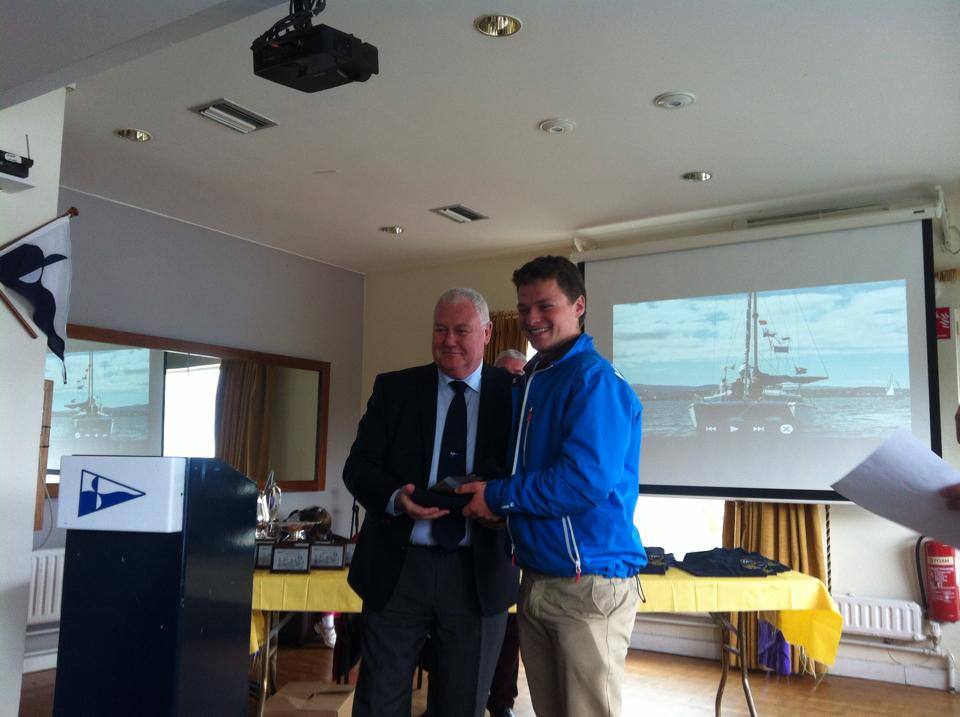
Alexander Rumball who claimed third overall in the RS Class
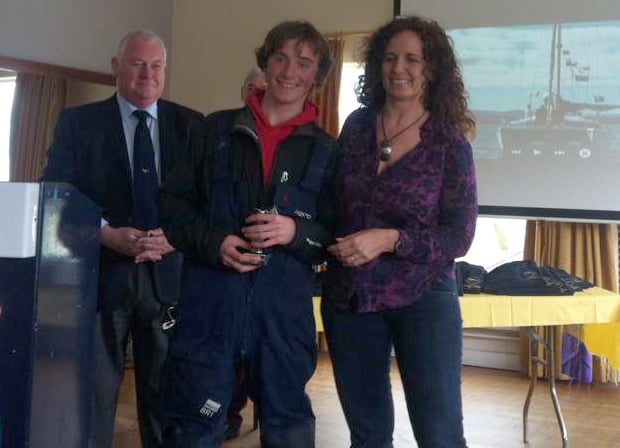
Loran Tighe of the INSS claims the Feva Trophy
INSS 1720 Sportsboat Wins DBSC Spring Chicken Series
#inss – Nerves of anticipation on board Team INSS yesterday morning as our Race Training Programme got towed out in no wind to the start line of the added race to the Rathfarnham Ford DBSC Spring Series writes Kenneth Rumball of INSS. Team INSS were lying joint second overall going in to the last race with only a point to gain to win the series overall.
The team got out to the race course early as per series co-ordinator Fintan Cairn's instructions to observe a minutes silence in honour of Caroline Leonard prior to the last race.
With a light easterly breeze building Fintan and team wasted no time in laying a quick windward leeward course aided by the Team INSS support RIB to get the windward mark laid quickly. A favoured committee boat bias on the start line saw 'Third Time Lucky' (helmed by Ben Cooke), Team INSS and 'Wolfe' (RstGYC) all coming away tightly bunched from the start line. The two 1720s from the Royal St George tacked off early after the start toward the East Pier with Third Time Lucky, Team INSS and Lady A (RIYC helmed by Collie Byrne) all continuing on starboard tack. Team INSS was the first to peel off and on the return cross it was apparent the right hand side was more favourable as the two boat from the Royal St George crossed ahead of Team INSS, Third Time Lucy and Lady A. Merlin and Wolfe rounded the top mark first and second, Team INSS in third.
Team INSS put in a quick gybe after getting the kite up and settled. Sailing into slightly more breeze, Team INSS accelerated ahead and on gybing back into the leeward mark, Team INSS crossed comfortably ahead of the other 1720s. The second beat was quite uneventful with little place changing as Team INSS aimed to capitalise on their advantage. Heading downwind to the leeward mark with minutes before rounding, the signal was give from the committee boat Freebird for a shortened course. Just crossing the line, Team INSS managed to pass the lead Flying Fifteen to claim Line Honours for the days racing and with that the 2015 Rathfarnham Ford DBSC Spring Series.
This was a great achievement for the clients on board our race training programme. It also marks a great start to the Irish National Sailing Schools Cruiser race Training Programme in conjunction with the ISA and ICRA.
With the purchase of Martin Breen's 'Lynx Racing' the Irish National Sailing and Powerboat School can now provide the same high quality race training on board a state of the art cruiser racer covering various roles such as bow in greater detail. The purchase of Lynx also see the Irish National Sailing and Powerboat School as the newest Royal Yachting Association cruising school offering all cruising courses including Yachtmaster courses.
Dun Laoghaire Dinghies Join INSS Sailors To Enjoy Challenging Conditions
#dbsc – At five minutes past one, the INSS Sailors competing in the DMYC Frostbites as part of the INSS Race Training Programme, were rigging their boats on the Coal Harbour Slipway, raring to go in a big breeze writes Kenneth Rumball. However it was not to be, the DMYC Frostbites race committee took the understandable decision that strong winds and swell from the Northerly wind in the harbour made attempting racing too difficult.
The trainees were disappointed, according to our race coach Alexander Rumball who was accompanying them in his RS400. So it was decided, Magnos and Laser IIs were put away in favour of Laser Picos with reefed sails. One of the Irish National Sailing Club members launched his Laser, accompanied by an INSS instructor in a school radial. With Alexander's RS400 included, there were the makings of a fleet large enough to get some racing done.
A triangle was set with the weather mark near the top of the West Pier, which according to the sailor's reports was a challenge to get around cleanly in the swell. On the start line we were joined by three more RS400's, a couple of Lasers and a Solo dinghy. The INSS support RIB acted as committee boat and two races were held. Unfortunately we aren't able to publish results as the Race Officer for the day doubled as safety boat driver and was called on to give a hand to a Laser which had dropped its rig during a capsize. While the rig was successfully put back up, the safety boat didn't quite make it back to be a committee boat in time to record the finishers.
No one seemed to mind though, everyone was just glad to be out on the water and enjoying the challenge the conditions posed. Our racing programme trainees were delighted with the chance to practice in stronger winds, and we were equally as happy to be able to provide the course, flags and a few horns so that the Dun Laoghaire dinghy sailors who braved the weather could join in too.
INSS Stage Mini Frostbite Series After DMYC Cancellation
#frostbites – After the baptism of fire from the morning's DBSC Turkey Shoot racing series, it was never a sure thing that the DMYC Frostbite Series would go ahead writes Kenneth Rumball. As predicted at approximately 12:15 the code flags N over A were hoisted above the DMYC on the West Pier in Dun Laoghaire. However a number of the younger sailors from the Irish National Sailing School had already gathered in the INSS Clubhouse and were keen to get out sailing after seeing the performance of their coaches in the breeze on the previous week. Knowing the condition from the morning racing, INSS manager Kenneth Rumball assisted by Glyn Williams and Alexander Rumball allowed the 9 keen young sailors to take out three squibs with a reef in to practise their starts and do a few short races inside the harbour.
Motoring out in the INSS launch which was to act as a committee boat for the day, there were a number of Laser Dinghies out sailing and also Shane McCarthy in his Solo dinghy despite the frostbite series being cancelled. In all there were 8 Lasers and the Solo. With Kenneth already planning on setting up a triangular course, and holding races for the Squibs, we invited the Lasers and the Solo to a separate start where we ran three races for the gang. Kenneth even jumped into the Solo for race number three to get a taste for the single-hander.
Our juniors in the Squib fleet used the conditions to build on their starting techniques which they have been struggling with in the PY class of the Frostbite series. The three boats crewed by three persons each soon shook out the reefs after conditions in the harbour were considerable more tame than the Turkey Shoot in the morning. Lorcan Tighe and his gang were dominant in the squibs, notching up three wins!
Sean Craig was consistently at the front if not helped slightly by his enthusiastic starting attitude. Great racing inside the harbour for the gang with lots of photos available on the INSS Facebook page here
Sail No. Race 1 Race 2 Race 3 Race 4 Cumulative
188347 1 4 1 2 8
171694 2 1 3 5 11
5302 6 5 2 1 14
200143 5 2 4 3 14
190317 7 3 5 4 19
177854 4 7 6 6 23
190745 3 6 7 9 25
165639 9 8 8 7 32
177891 8 9 9 8 34
Big Winds Don't Deter INSS. No Racing, No Problem!
#inss – A blustery forecast and strong winds passing through Dun Laoghaire on Saturday night was not a good omen for the DBSC Turkey Shoot on Sunday morning. Indeed the code flags N over A were flying from the committee boat Freebird from as early as race skipper Alexander Rumball got to his boat, circa 9am writes Kenneth Rumball. What to do for our race training candidates on a Sunday morning was of course the next question?
Well, let's go sailing! Using our smaller fleet of dayboats, our modified Squibs, race training skipper Kenneth Rumball assumed the role as principal race officer, with Glyn Williams and Alexander Rumball assisting in coaching and mark laying. We had a few guests including Peter Hall and Noel Butler both who learnt to sail in the INSS but now race the 34.7 Adelie which also competes in the Turkey Shoot coming along to try their hand at racing in the squibs.
Laying a triangular course inside the harbour we had a visit from some of other competitors from the Royal St George who came out in a RIB to check were we okay as the conditions were quite rough to go sailing in.
We had three fantastic races with all crews beaming afterwards from having such a thrilling sail and in some cases clearing some sore heads from the antics of the night before!
A similar tale befell the DMYC Frostbite Series with racing also called off early due to the prevailing weather. Rather than bring our dinghy sailors out in the squibs, three of the INSS instructors, Kenneth and Alexander Rumball and Conor Corson took a Fireball dinghy and laser dinghy out for a spin. This activity was not just for fun but to show our junior sailors how to handle dinghies in the higher winds, using our new state fo the art 6.5m RIB, Glyn Williams brought 6 of our junior sailors out to watch both dinghies in action. A video of the day is available on the INSS youtube page.
A worthwhile and fun experience for instructors and sailors alike.
#turkeyshoot – The 2014 Dublin Bay Sailing Club Turkey Shoot Series sees the third time the INSS has entered two 1720 Sportsyachts into the exciting winter series writes school principal Kenny Rumball. The 1720s are skippered by Kenneth and Alexander Rumball as part of our race training programme where we aim to teach our crews the techniques and intensity required to race at the top of the fleet. With a training weekend having been blown out the previous weekend and the reserve day being the Saturday afternoon before racing also blown out, our teams had little practise time ahead of stepping on to the boats on Sunday morning. Initial forecasts and the weather in the morning was a manageable 16-18kts.
Boats rigged, masthead spinnakers plugged in, the two teams headed out into slightly more breeze than forecast, a quick change down from mast head to fractional kites prior to the start as we now saw gusts up pas t 20kts. Both teams started well with INSC1 (Kenneth) more towards the starboard end of the line and INSC2 (Alexander) more towards the pin end of the line. Neither INSC teams made the mistake of going to the far right of the bay where the prior two fleets mistook the Flying Fifteen windward mark as our windward mark despite assurances from the committee boat that the mark was 'well left'. INSC1 sailed up the middle of the beat covering Colin Byrne and his team on RIYC and Brian Matthews skippering a 1720 from the NYC. INSC2 went the best way up the beat and went well left, popping around the top mark ahead of most of the the two fleets that started prior to us. INSC2 attempted to fly the masthead spinnaker on the top reach but were wiser and doused it before taking an early bath. INSC1 rounded as third 1720 and could not catch INSC2 or the experienced crew racing the NYC boat with Brian. The pecking order at the top of the fleet stayed much the same with Brian and his team from the NYC claiming the spot of first 1720 across the line followed by INSC2 and then INSC1. A thrilling start to the series in challenging conditions with some breakages and an injury to which both INSC teams express their best wishes to the injured crew member.
'Big Boat' racing over, and the attention turned to the DMYC Frostbite Series where for the first time, the INSC/INSS gave our club members the opportunity to race in this fantastic series in our fleet of performance dinghies backed up by on the water support and coaching and a de-brief after every race. With views from the team INSC skippers Kenneth and Alexander sailing their Fireball and RS400 respectively and on the water support given by Glyn Williams, our new programme give a unique perspective on how to improve your dinghy racing. We have four adult members sailing Laser dinghies with one of our dinghy instructors also chartering one of our lasers before forgetting the four double handers we have entered crewed by members of our Junior Club programme.
Following on from the mornings racing the conditions had somewhat moderated slightly for the afternoon. Our new racers thoroughly enjoyed the intensity of the new experience with big smiles and a steep learning curve ahead of them. Also racing were other members of our junior club in their RS Feva dinghies. All sailors enjoyed a thorough debrief after racing in the INSC Clubhouse where Kenneth gave his inside view on how to win the days race after a close battle with long time competitor Noel Butler a former INSS pupil. Alexander was able to give his view and answer questions from the perspective of the coach RIB for the day due to a parts delay for his RS400.
All our sailors then made their way to the DMYC Clubhouse for some coffees and hot soup with Carlos and Fiona behind the bar and kitchen delighted to see some new faces.
Our winter racing programmes are now full but if you are interested in these programmes, we will have some spots available after the Christmas break.
#sailathon – Had you been walking the East or West Pier of Dun Laoghaire Harbour on Saturday morning around 9pm you would have seen an INSC 1720 rigged as a committee boat make its way out into Dun Laoghaire Harbour's training area. This was to be the committee and mother ship for the Irish National Sailing Schools annual charity Sail-A-Thon, this year in aid of the Royal National Lifeboat Institution. Approximately an hour later at 10am 75 young sailors aged from as young as 7years took to the waters of Dun Laoghaire Harbour and made their way up to the main harbour. Some INSS instructors took to the piers both East and West with collection buckets to show why so many young sailors were out on the waters of Dun Laoghaire Harbour.
To break up the day there were various games and races throughout the day as the strong easterly winds built up during the day. Our keen sailors took a short break for lunch as many needed to re-energise before heading back out for the afternoon stint.
To wrap up the day, members of the Dun Laoghaire lifeboat unit called in to allow the children to ask them questions and also to be presented with the cheque for the amount raised on the day. There was a BBQ in full swing with many parents of the children also coming down to meet the lifeboat crew.
The presented cheque was €1,855 for the day with many more sponsorship forms and money still to be collected.
Gales No Obstacle for Irish National Sailing School Winter Sailing Programme
#inss – The Irish National Sailing Club (INSC) Race Training Team that usually competes on a Sunday morning in the DBSC Spring Chicken series were welcomed yesterday morning in Dun Laoghaire by gusts of 30-40 kts writes Kenneth Rumball.
The mood in the INSC was of disappointment that for the second time in this series the race training crews would be unable to go racing on the INSC 1720 Sportsboats. Later while travelling over to the Royal Irish Yacht Club (RIYC) pontoons where the boats are kept during the winter months in our launch, the lack of activity of boats on the marina and in the Royal Irish Yacht Club coupled with code flag N flying from the marina flagstaff confirmed our suspicions that racing would indeed be cancelled for the day.
Undeterred our crews returned to the INSC clubhouse where Kenneth gave an brief lecture on how to use a compass most effectively in inshore yacht racing both pre-start and during the race. During this one of the crew members of Adelie a 34.7 from the National Yacht Club that is now crewed by a mixture of INSC staff and INSC graduates suggested a race between the current crew of Adelie and the INSC Race Training Team.
Challenge Accepted!
A quick agreement that Kenneth and Alexander would act as race officer and mark layer respectively, our Race Training Team and the Adelie crew left the INSC Clubhouse to take our fleet of Squibs out for some racing inside the Harbour.
Despite gust of 30+ kts, 5 squibs with two reefs and crewed by two persons headed out for three races. INSC staff were put under pressure by INSC graduates with one particular staff member only winning a race due to an INSC graduate coming a little too close to the last leeward mark! Close racing in our fleet of identical modified Squib keelboats ensured it was the best sailors who won the races and not the fastest boat! The Race Training Team who would usually expertly crew the 1720s were now putting their helming skills to the test while Alexander gave race coaching during the races to ensure everybody learnt as much as possible from the day!
A fantastic morning that meant our sailors were still able to take to the water and learn despite both the DBSC Spring Series and DMYC Frostbites being held ashore.
Youth Sailors Brave Chilly Waters at Dun Laoghaire for Sailing School Fun
#inss – There were plenty of thrills and spills in Dun Laoghaire harbour last weekend when local youths took to the chilly February waters as part of the Irish National Sailing School's year round sailing syllabus.
The Irish National Sailing School Junior Club is a way for young sailors to keep sailing during the school terms. Sailors have a choice of sailing either from 10am to 1pm or from 2pm-5pm on Saturdays.
While they primarily sail in dinghies, on the particular cold days children take out fleet of keelboats (1720s and Squibs) allowing them to keep sailing and stay warm in the colder conditions. Sailing on the bigger keelboats also broadens the children's skills and allows them to venture further afield.
Children from as young as 7 are out sailing in the club every Saturday combining the fun and skills of sailing while making new friends and socialising says centre principal Kenneth Rumball. 'There are always plenty of spaces available with new sailors welcome to sign up at any stage', he adds.
The Summer term is running on the following Saturdays February 1, 8, 15, 22 March 1, 8, 15, 22, 29 April 5, 26 May 3, 10. During the 13 weeks children build on their sailing skill and progress through their logbooks to ensure they are learning all the time and gaining extra valuable skills along the way.
For full dates, time and prices see the Junior Club Sailing website



























